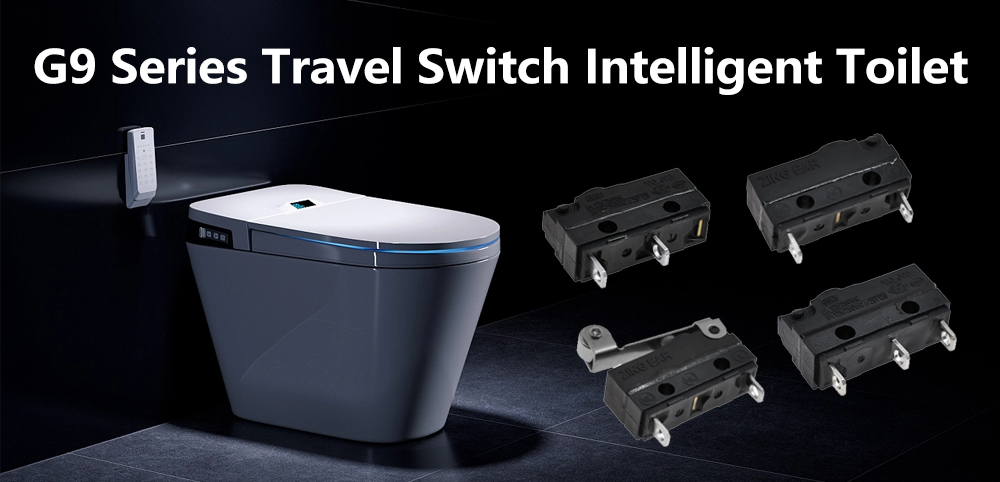The G9 series travel switch by Omron Corporation is a versatile and reliable travel switch that can be used in various applications, including intelligent toilets. Intelligent toilets, also known as smart toilets or bidet toilets, are advanced toilet systems with features such as automatic flushing, adjustable water temperature, bidet cleansing functions, and more.
In an intelligent toilet, the G9 series travel switch can be used to detect and control various functions. For example, the travel switch can be integrated into the seat or lid of the toilet to detect their position. This allows the toilet to automatically flush when the user stands up or closes the lid after use. The precise and accurate operation of the G9 series travel switch ensures reliable functionality and enhances the overall user experience.

1.G9 series travel switch working principle
The G9 series travel switch is known for its durability and precision. It is designed to withstand frequent use and can handle a high number of electrical cycles without compromising its performance. This makes it an ideal choice for applications where reliability and long lifespan are crucial.
Integrating the G9 series travel switch into intelligent toilets enables the automation of various functions, improving convenience, hygiene, and user comfort. Additionally, the use of high-quality travel switches like the G9 series helps ensure the longevity and reliable operation of intelligent toilet systems.
A travel switch, also known as a limit switch, is a type of sensor that detects the presence or absence of an object by physical contact or proximity. It is commonly used in industrial applications to monitor and control the position of mechanical components or to indicate the end of travel in a system.
2.The basic structure of travel switch
Travel switches typically consist of housing, actuator, and electrical contacts. When the actuator or target comes in contact with the switch, it triggers a mechanical action that activates the electrical contacts, signaling the presence or absence of the object. Depending on the application and requirements, travel switches can have different actuator types, such as plunger, roller lever, or spring rod.
Travel switches find application in a wide range of industries, including manufacturing, material handling, automotive, and more. They are often used in automated machinery, conveyor systems, robotic arms, and safety systems to ensure proper positioning, control motion, and provide feedback on the status of mechanical components.
Proper selection, installation, and maintenance of travel switches are crucial to ensure their reliable operation and safety in industrial settings. It’s important to consider factors like the specific requirements of the application, environmental conditions, and the desired electrical and mechanical specifications when choosing a travel switch. Regular inspection and cleaning are also recommended to prevent any potential malfunctions due to dust, debris, or wear and tear.
3. Introduction of smart toilet
An intelligent toilet, also known as a smart toilet or hi-tech toilet, is a type of toilet that incorporates advanced technologies and features for enhanced comfort, hygiene, and convenience. These toilets often go beyond the basic functionality of a traditional toilet and can offer a range of innovative features.
Some common features found in intelligent toilets are:
Bidet Functionality: Many smart toilets include built-in bidet features that provide adjustable water sprays for cleansing after using the toilet. These bidet functions often offer customizable water temperature, pressure, and spray patterns.
Heated Seats: Intelligent toilets often come with heated seats, allowing for a more comfortable experience, especially during colder seasons.
Automatic Flushing: Some smart toilets have sensors that detect when the user has finished using the toilet, triggering an automatic flushing mechanism. This feature can help to minimize contact with the toilet and improve hygiene.
Odor Control: Intelligent toilets may include features like deodorizers or air purification systems to help eliminate unpleasant odors and maintain a fresh bathroom environment.
Automated Functions: Certain smart toilets have additional automated functions such as hands-free opening and closing of the toilet lid, automatic seat temperature adjustment based on user preferences, and automatic air drying after bidet use.
Integrated Controls: Smart toilets often have user-friendly control panels or remote controls for easy customization of various settings, such as water temperature, bidet functions, and seat heating.
Intelligent toilets are commonly used in residential settings, as well as in high-end hotels and other public facilities. They offer enhanced hygiene, comfort, and convenience, and can contribute to a more sophisticated and modern bathroom experience.
